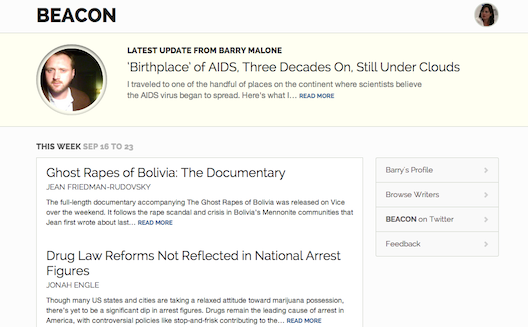Can new media site Beacon create good revenue streams for longform journalists?


Beacon, billing itself as a new kind of media outlet, launched
last week to
considerable
fanfare. The site works on a subscription basis: readers pay $5
per month to directly support a writer whose work they enjoy, and
in doing so have access to exclusive work from a handpicked pool of
journalists working around the world. Writers receive the majority
of their readers’ subscription fees, with a percentage taken out to
support Beacon’s small team and operations.
This launch is the latest in an
increasing pool of media projects seeking to recast the traditional
relationship between writer, media conglomerate, and reader.
Outfits like Ev Williams’ Medium,
similar to Beacon but without the paywall, seems focused on
creating a community where writers (or engineers, or doctors) can
post short pieces on anything at all, and readers can access and
interact with them in an informal setting.
Other new media projects,
like Demotix and Transterra Media here in
Lebanon, collect photographs and
articles from freelance journalists, then pitch them on the
journalists’ behalf to traditional media conglomerates. The logic
is that the middleman has more contacts and better relationships
with big media, ensuring at least that the pitch is looked at,
rather than lost in an inbox among all the other cold pitches.
Given the ongoing crisis
in the traditional newspaper industry and the subsequent
massive
spike in freelance journalism
over the past decade, it’s no surprise that services like these,
ostensibly serving the writer rather than the big (bad?) media
company, have proliferated. But, in the case of Beacon and Medium,
will readers trust content that isn’t put through the traditional
paces of proof-reading, fact-checking, and editing?
Beacon seems to be
approaching this question by investing in the idea, nurtured by
Twitter, that a significant part of journalism today is about the
cults of personality built around the writers themselves.
Co-founder Dan Fletcher tells Forbes that Beacon is “about buying
into a writer as a whole,” rather than into a particular story or
set of photographs.
Each of the nearly 30
Beacon writers have extensive profiles, with photographs and video,
telling readers about their past work and what they hope to
accomplish with Beacon, and of course linking to their obligatory
Twitter feeds. Beacon writers do seem to know how to sell
themselves as a product: in the writer profiles, more than one
Middle East-based journalist boasts about how long they’ve lived
somewhere, or how many times they’ve been to a particular hotspot,
rather than focusing on their contacts or journalistic prowess.
But, while Beacon is
benefitting from journalists’ Twitter swagger, its emphasis on
longform content might be read as a reaction to the
fragmentation of news into
headlines and tweets, fueled by
preferences for mobile. Longform
journalism had two victories last month, with the launch of
Medium-backed longform-only site Epic by two New York Times reporters, and
Politico’s
announcement that it would be
focusing more on investigative work – in print, no less. It seems
people want – and are willing to pay for – well-researched,
impeccably-written, longform content. Beacon picks writers who not
only have the online bravado, but who have also proven their
capacity to deliver good work that’s longer than 140
characters.
Despite Beacon’s
calculated model, it remains to be seen whether readers and fans
will shell out $60 per year to read dispatches from a pool of
freelance reporters.
In the Middle East, very few outlets are experimenting with
longform journalism online, outside of print magazines that
also have websites. Project Pen and 7iber.com in Jordan are two, neither of
which would likely be able to implement a paywall. At Wamda, where
you won't see a paywall anytime soon, we'll also be experimenting
with longform, looking to see how the experiment plays out on other
portals like PandoDaily (where Editor Sarah Lacy has noted its
surprising success). At the very least, Beacon's move is an
attempt to fix a broken industry – and the effort is
appreciated.


